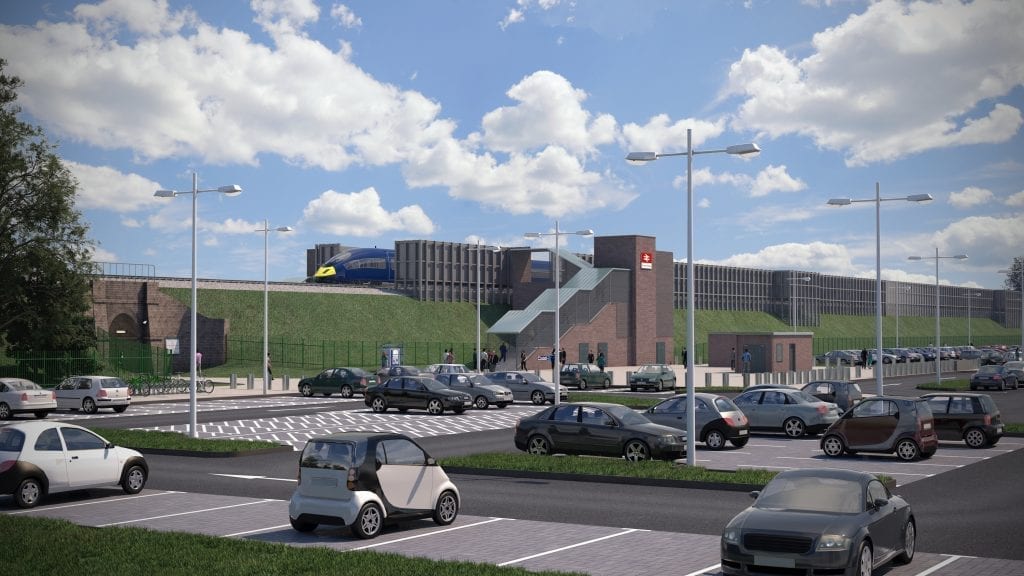
The final list of 34 projects that will receive funding from the South East Local Enterprise Partnership’s (SELEP) £85 million share of the Government’s new Getting Building Fund has been announced.
The new projects will deliver 9,167 new jobs and safeguard a further 3,341. There will be 7,234 new homes unlocked, over 50,000sqm in new commercial space unlocked and 8,663 new learners assisted through new skills facilities and programmes. Ranging from a new rail station in East Kent, new skills and training hub in Newhaven, bringing greater connectivity to rural areas, a new solar farm to power up the railways in East Sussex and new cycle network infrastructure in Essex, these 34 projects will start quickly, and help catalyse economic recovery and renewal across East Sussex, Essex, Kent, Medway, Southend and Thurrock.
Government’s new £900 million Getting Building Fund has been created to invest in local infrastructure projects to drive economic growth in the wake of the COVID-19 crisis. With an £85 million share, SELEP successfully secured the largest allocation for any LEP area in the UK. The fund was announced by Government alongside a further £360 million investment to deliver 26,000 new homes on brownfield land.
Housing Secretary Rt Hon Robert Jenrick MP said:
“As we get Britain building we are also laying the foundations for a green economic recovery by investing in vital infrastructure for local communities, creating jobs and building environmentally friendly homes with a huge £1.3 billion investment announced today.
“This Government is determined to level up all parts of the country and this funding will not only give a much-needed boost to our economic recovery, it will help build the good quality, affordable homes the country needs.”
In mid-July, SELEP Directors met to review and narrow down the previously submitted longlist by focusing on projects that can progress quickly but will also stimulate and better integrate economies in some of the most economically impacted and COVID-affected parts of the South East. People in coastal areas and market towns will see their town centres enhanced, with old or disused buildings brought back to life. There will be 2,183 created in the construction sector. New business and educational spaces will provide 50,813sq m of new grow-on and commercial space. There will be new skills infrastructure, 9,128sq m of new learning space and 8,663 new learners to be assisted. This will mean existing and new, growing sectors – innovative green technologies, manufacturing, transport and logistics, housing, cultural and creative – can thrive. Much-needed investment in broadband rollout will stimulate economic activity in rural and more remote areas.

Projects on the final list cover a wide range of areas in need of support including digital capabilities so companies can adapt; COVID-secure workspaces for businesses; skills development to help workers either retrain for a new industry or further develop skills; and the clean growth agenda. The impetus given to these ensure that sites are unlocked and that the creation of new jobs is stimulated across the whole of the area.
As an example, some projects set to receive a share of the £85 million include:
- Accelerating full-fibre broadband to rural and hard to reach premises in Essex;
- Romney Marsh Employment Hub: the second stage of a project that provides infrastructure to services and brings forward the remaining five hectares of employment land in Folkestone and Hythe, creating 480 new jobs;
- Britton Farm Redevelopment Learning Skills and Employment Hub: an innovative adult learning and skills hub in Medway;
- Thanet Parkway station: the delivery of a new railway station in East Kent to improve connectivity to these coastal communities;
- Swan Housing: a new facility for a modular housing factory in Basildon, to support the fast pace of housing construction to meet pressing demand;
- UTC Maritime and Sustainable Technology Hub: the creation of an education-led skills training centre with commercial workspace for SMEs specialising in the marine sector, located in Lewes; and
- The Observer Building, Hastings: the restoration of a local landmark including four floors of leisure, retail, offices, studios and community space.
There are also several projects that will accelerate and extend the rollout of full-fibre broadband across Essex, Kent and Medway to provide greater connectivity to some of the most rural regions across the SELEP area. The full list of projects can be found here.
South East LEP Chair, Christian Brodie said:
“We are delighted that government has recognised the excellent projects and potential that the South East has to drive forward our economy at this challenging time. These projects have been carefully selected to target those areas and industries particularly vulnerable to COVID-19 and those that can progress, at pace, to support economic recovery. The South East LEP has a proven track record of delivering successful projects and has been working really closely with our local areas to understand what our businesses need and where investment will have significant impact.
“Over the last few months, we as a LEP have been providing support to local businesses. Our Growth Hubs have been providing advice to struggling businesses and directing businesses to funding support. We have also been reworking our own existing funding pots to create new COVID-19 funds for businesses, infrastructure investment and skills training.
“We truly believe that the South East will help lead the country out of the crisis and into recovery. The Getting Building Fund provides the next phase of financial stimulus to restart our economy.”
Chair of the LEP Network, Mark Bretton said:
“As business led partnerships with a ready-made pipeline of projects, LEPs responded swiftly to the Prime Minister’s call for infrastructure projects with more available when Government is ready.
“LEPs’ ‘can do’ business attitude has created a proven track record of complex delivery, landing projects at scale, on time and to budget. The foundations they are building for local recovery in their Five Point Plan will underpin our national recovery.”
Of the Thanet Parkway project, Sir Roger Gale MP, North Thanet said:
“Thanet Parkway Station is a key piece of the jigsaw that will open up East Kent to investment and employment and will also facilitate the re-opening and success of Manston Airport. The confirmation that the SELEP bid for funding has been approved by Government is therefore a significant step forward. I am most grateful for the effort that SELEP has put into achieving this result.”
Of the Britton Farm Learning, Skills & Employment Hub project, Leader of Medway Council, Cllr Alan Jarrett, said:
“We are extremely pleased that Medway is set to receive up to £1.99million for an innovative adult learning and skills hub in the heart of Gillingham town centre. These exciting plans will provide growth for all and will help our residents learn new skills and access a wider range of employment opportunities. The skills hub complements our ongoing regeneration plans for Britton Farm providing offices and affordable homes in the town centre which will further increase footfall in the high street. We have all been impacted by the ongoing coronavirus pandemic, but it is of the upmost importance that we continue to invest in Medway’s future.”
Of the UTC Maritime and Sustainable Technology Hub project, Leader of Lewes District Council, Cllr James MacCleary, said:
“As someone lucky enough to live in Newhaven I know how important this landmark building is to the town. It has such potential and it’s been so sad seeing it sit empty for so long. I’m also pleased that proposed completion on the UTC hub project is relatively soon, scheduled for March 2022 it will dovetail with bids for even more investment in our town. Newhaven is really on the up and this is just more proof of that. The Co-operative Alliance has made support for businesses central to our plans for the district, so the prospect of this new commercial workspace, alongside an education and training offer, is very welcome.”
Of the Observer Building, Hastings project, Jess Steele, Director of White Rock Neighbourhood Ventures Ltd, said:
“We are delighted to be selected for the Getting Building Fund. Ambitious, community-led spaces like the Observer Building have the power to spark the kind of neighbourhood regeneration and transformation we need if we are to respond to the challenges that lie ahead for Hastings. We will be creating spaces for all kinds of uses that can adapt over time to meet community need and improve the local economy. The building is also a cornerstone of the Hastings Commons, an ecosystem of connecting buildings that will be community-owned and run in an historically deprived part of the town. We would love to see many more projects like this get the funding and support they need.”
Of the full-fibre broadband to rural and hard to reach premises in Essex project Connie Kerbst, Senior Programme Manager at Essex County Council said:
“Essex County Council’s award-winning broadband programme, Superfast Essex, has already transformed internet connectivity for rural areas of our county. During the recent COVID-19 lockdown many businesses have started to develop new online business models to support their future success. The new funding will bring fast broadband to additional sites in very rural and hard-to reach areas of Essex, ensuring their location is no barrier to business innovation and growth. The work will be delivered promptly and will be a key element of our economic recovery strategy.”
Mike Whiting, Kent County Council’s Cabinet Member for Economic Development, said:
“I am delighted that the three projects put forward by KCC have been approved for the funding we requested. All three will have a significant impact on the economic future of the areas involved. Thanet Parkway, in particular, is important as it will make East Kent more accessible for companies and employees alike, bringing London only just over an hour away.
“Improving broadband connections to more of the rural areas of Kent and Medway has become even more vital with the current emphasis on home-working during the COVID-19 pandemic.
“And although the Javelin Way project has been in the pipeline for some time, the impact of COVID-19 had put its immediate future in jeopardy, and the funding means that work can start immediately and the development will move forward at pace.”
Mayer Schreiber, CEO of Discovery Park, said:
“The Getting Building Fund grant will accelerate the delivery of Discovery Park’s Incubator space, which will provide laboratories and offices for innovative life sciences companies in a collaborative environment. As a UK Life Sciences Opportunity Zone, we are pleased to play a role in driving local economic growth, bringing high value scientific jobs to the region.
“Discovery Park would like to thank SELEP for its support of our ambition to build a world class and world leading science park, a place where companies can start up and grow.”
LEPs were asked to put forward proposals for shovel-ready projects that could be delivered within the next 18 months. SELEP submitted a £573 million bid to Government for a long-list of 170 projects. You can read more about SELEP’s bid to Government here.